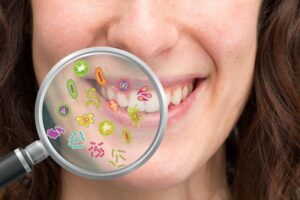
It is well-known that bacteria in the mouth are responsible for the formation of tooth decay and cavities. But there are hundreds of species of bacteria in your mouth! Most of them are harmless, and many of them are even helpful. In fact, relatively few are bad news. In this blog post, you can learn about two types of bacteria that can endanger your smile.
Streptococcus Mutans and Cavity Formation
In the past, it was largely believed that a species of bacteria called streptococcus mutans (S. mutans) was the main microorganism involved in the formation of cavities. Indeed, this species metabolizes sugars in the mouth, which produces a type of acid that can harm teeth. It can also adhere to enamel and form the sticky biofilm that we know as plaque.
Yes, S. mutans plays a large role in cavity formation. However, research published in 2023 indicates that another species of bacteria may share some of the blame for tooth decay.
Selenomonas Sputigena and Cavity Formation
Researchers in Philadelphia recently looked at samples of plaque from 300 children aged 3 – 5, half of whom had caries (cavities). They followed-up their research by analyzing an additional 116 plaque samples in order to verify their findings.
They discovered that S. mutans does not always act on its own to produce cavities. Indeed, another species of bacteria, known as S. sputigena, may enhance its power to damage teeth. Essentially, this bacteria forms honeycomb-like structures that surround and protect S. mutans, leading to increased acid production. Therefore, although S. sputigena does not cause cavities on its own, it is still at least partially responsible for caries formation.
What Does the Research Mean for You?
Unless you love microbiology, the specific names of bacteria that lead to cavities may not matter much to you. However, scientists may use this new information to deepen their understanding of how cavities can be prevented.
In the meantime, the best thing you can do is continue your efforts to protect your smile from all types of harmful bacteria. You can do so by adhering to a thorough oral hygiene routine and regularly visiting your dentist for cleanings and checkups.
Science is amazing! Hopefully, new insights into cavity formation will lead to healthier smiles all around the world.
Meet the Practice
Jasper Dentistry operates under the leadership of three extremely talented women: Drs. Michele Jasper, Chelsea Anderson, and Roni Sue Rosati. They proudly work together to help members of the Fort Mill community enjoy healthy and strong smiles. If you have questions about how you can optimize your oral health, our team would be pleased to speak with you. Contact us at 803-548-4353.
